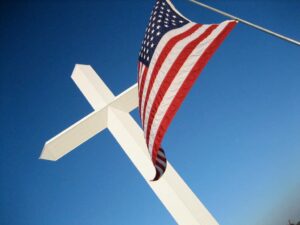Since we celebrated Independence Day last week, I thought it important to understand how the majority of its founders acknowledged that God had a hand in building this greatest nation on earth despite what the naysayers and cynics say.

American’s confidence and belief in the bible is at an all-time low with only 20% saying that the Bible is the literal Word of God, according to a recent Gallup Poll. In addition, there’s a decline in overall religiosity in the U.S. adult population including
- declines in formal identification with a religion
- declines in church membership
- declines in religious service attendance,
- declines in the personal importance of religion,
- and declines in belief in God.
This is tragic because we as a nation were founded on Christian principles. Want proof? I’ll bet you didn’t learn this about Christopher Columbus’ reason for setting off to discover a new world:
“I was led of the Holy Spirit to carry the message of the Gospel to undiscovered lands.”
This is what the Pilgrims wrote in the Mayflower Compact about why they came in 1620:
“In the name of God, amen. Having undertaken for the glory of God and for the advancement of the Christian faith, do solemnly and mutually in the presence of God, covenant and combine ourselves together.”
Twenty-three 23 later, as more and more people settled in New England, the Puritans formed The New England Confederation. This is in their Constitution:
“Whereas we all came into these parts with one and the same end and aim, namely, to advance the kingdom of our Lord Jesus Christ, and to enjoy the liberties of the gospel in purity and peace.”
As each state organized itself, the founders’ commitment to the Gospel is evident in the documents drafted:
The defining purpose of the colony is clear in The Delaware Charter: “To further propagate the Holy Gospel.”
The Virginia Charter: “Propagate the Christian religion to such people who yet live in ignorance of the true knowledge and worship of God.”
The Rhode Island Compact: “We submit our persons, lives, and estates unto our Lord Jesus Christ, the King of Kings and Lord of Lords.”
At the signing of the Declaration of Independence, Benjamin Franklin said:
“Gentlemen, if it is true that not one single petal from any flower falls to the ground without escaping God’s attention, will the distress of this nation go unheeded? Let us therefore determine to seek His face.”
You know what happened after he said that? Every one of the 56 signers of the Declaration of Independence took a knee. Not to protest police brutality, but to pray and seek the wisdom of God. How awesome would it be if the members of Congress took a knee to the Lord God Almighty?
This is what George Washington wrote in his Personal Prayer Book:
“Oh, eternal and everlasting God, direct my thoughts, words and work. Wash away my sins in the immaculate blood of the lamb and purge my heart by the Holy Spirit. Bless, O Lord, the whole race of mankind and let the world be filled with the knowledge of thy son, Jesus Christ.”
The 6th President of the United States, John Quincy Adams, said this in 1821:
“From the time of the Declaration of Independence, the American people were bound by the laws of God and the laws of the gospel of Jesus Christ, which they all acknowledge as the root of their conduct. We all came together to obey the word of God.”
By the way, Adams was also the chairman of the American Bible Society.
Patrick Henry: “It cannot be emphasized too strongly or too often that this great nation was founded not but religionists but by Christians, not on religion, but on the gospel of Jesus Christ.”
The framers of our nation got the idea of the three branches of government from Isaiah 33:22:
“For the LORD is our judge, (Judicial branch)
the LORD is our lawgiver, (Legislative branch)
the LORD is our king; (Executive branch)
it is he who will save us.”
In 1782, the United States Congress voted this resolution: “The Congress of the United States recommends and approves the Holy Bible for use in all schools.”
Look at the role pastors played in the early days of America:
A pastor, Frances Bellemy, wrote the “Pledge of Allegiance.”
Another pastor, Samuel Smith wrote the Hymn “My Country ‘Tis of Thee.”
John Leland, yet another pastor, wrote the introduction of the first Amendment to the Constitution.
Most of America’s College Presidents were preachers of the Gospel. 106 of the first 108 colleges were started on the Christian faith.
Harvard College, named after John Harvard, a Christian minister, was founded in 1636 with this statement being its Original Rule:
“Let every student be plainly instructed and earnestly pressed to consider well, the main end of his life and studies is, to know God and Jesus Christ which is eternal life, and therefore to lay Christ…as the only foundation of all sound knowledge and learning.”
Yale was established in 1701 “for the…religious education of suitable youth…to propagate in this wilderness, the blessed reformed Protestant religion….”
Princeton was started with its first President Rev. Jonathan Dickinson declaring, “cursed be all that learning that is contrary to the cross of Christ.”
The “New England Primer” was America’s first schoolbook. The Lord’s Prayer was on its cover. The alphabet was taught in Theological verse:
- “In Adam’s fall we sinned all.”
- “It’s Heaven to find, the Bible’s mind.”
- “Christ crucified for sinners died.”
To deny the Christian influence on the founding of America, “One Nation Under God,” is to be grossly ignorant, or willfully revisionist.
Not every founder was an Evangelical Christian, but they did acknowledge that God was the Supreme Ruler over man and his government. And not just any old god, it was the freedom to worship the Lord Jesus Christ.